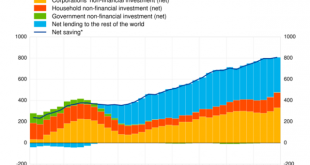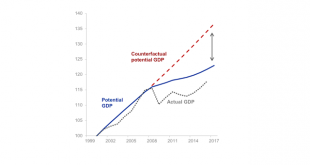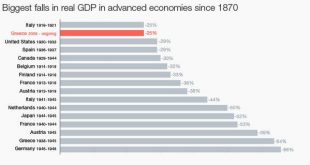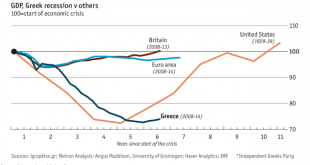Sectoral balances can tell us so much about what is going on in an economy. Especially when they are expressed as a time series, as in this remarkable chart from the ECB: Although it is a time series, this is not a rate-of-change chart. The y axis is in billions of Euros, not in percentage growth rates. But the chart nevertheless shows that Eurozone net saving has risen steadily since the financial crisis, except during the Eurozone crisis of 2011-12 when it dipped slightly. What do we mean...
Read More »IPA’s weekly links
Guest post by Jeff Mosenkis of Innovations for Poverty Action. Chris found this above, (from a 2016 post) anthropologist Jennifer Esperanza got annoyed at how her field’s textbooks always had exotic cover images, when anthropology is really the study of all humanity. “‘Why can’t there be images of, for example, a group of white American women eating salads, on the cover?,’ she asked.” Dori Tunstall and Julie Hill took up the challenge of putting white people on the covers of anthro...
Read More »Understanding Macro: The Great Depression (1/3)
from Asad Zaman Preliminary Remarks: “The trouble is not so much that macroeconomists say things that are inconsistent with the facts. The real trouble is that other economists do not care that the macroeconomists do not care about the facts. An indifferent tolerance of obvious error is even more corrosive to science than committed advocacy of error.” From The Trouble with Macroeconomics (Paul Romer) Personally, I do not understand why indifference to error is worse than committed...
Read More »The problem with words
Ah, those pesky words. They do not mean what we think they do. And sometimes we say one thing, but people think we mean another. And so it is that David Glasner, in a beautifully crafted takedown of my previous post, has managed to miss my point entirely.I did, in fact, read carefully all of David's quotation from Ralph Hawtrey, though I did not quote all of it. Hawtrey's point is that what appeared to be destructive competitive devaluation as countries left the gold standard was in fact...
Read More »Euro area depression, charted
"The euro area economy is gradually emerging from a deep and protracted downturn. However, despite improvements over the last year, real GDP is still below the level of the first quarter of 2008. The picture is more striking still if one looks at where nominal growth would be now if pre-crisis trends had been maintained." So said Peter Praet, Member of the Executive Board of the ECB, in a recent presentation to the FAROS Institutional Investors' Forum.He's not wrong. From his presentation,...
Read More »The dangers of historical taboos
The Group of 30 central bankers and economists has produced a new report, "Fundamentals of central banking: lessons from the crisis". It traces the history of central banking theory and practice, including the economic thought that underlies it. And it draws from it some important lessons about the causes of the 2008 crisis and the reasons for the very long, slow recovery. I've discussed the main themes of the report here (Forbes).But in this post, I want to focus on a particular piece of...
Read More »When reason departs
In my last post, I pointed out that Greece's current depression is by no means the worst since World War II, as is often stated, and that the US's Great Depression was not the worst depression in history either. For reference, I'm putting up Tony Tassell's chart again.I'm frankly appalled by the comments on that post. The arguments used to justify the prevailing views amount to the following.1. The other countries in the list aren't rich Western countries, so they don't count.Eh???2....
Read More »Not such a Great Depression
We're used to hearing that the current Greek depression is the longest and deepest since World War II, aren't we? And that the worst depression in history was the US's Great Depression?Via the FT's Tony Tassell comes this chart:Looks like the fall of the Iron Curtain, the collapse of the Soviet Union and the first Gulf War did far more damage. Not to mention the numerous wars and crises in Africa. The current Greek depression just about makes it on to the bottom of this chart, and the other...
Read More » Heterodox
Heterodox






